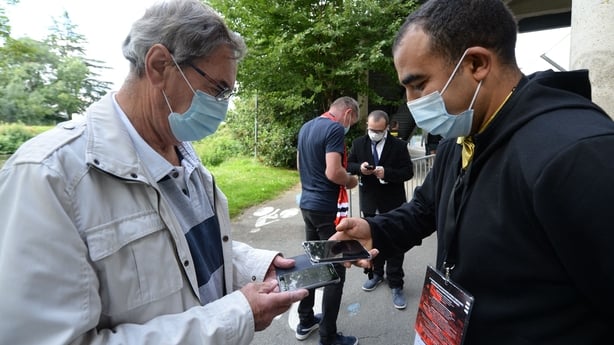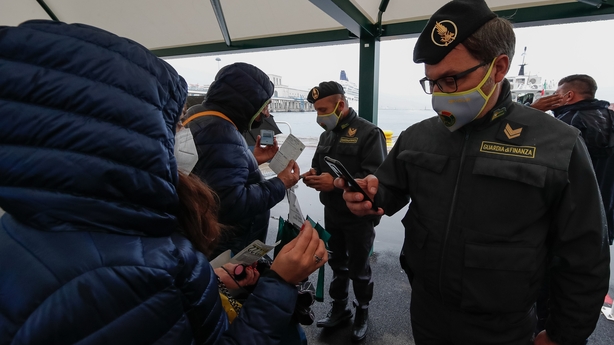The European Centre for Disease Prevention and Control today warned that vaccinations alone will not stop the rise of the Omicron variant of coronavirus and said "strong action" was urgently needed.
"In the current situation, vaccination alone will not allow us to prevent the impact of the Omicron variant, because there will be no time to address the vaccination gaps that still exist," Andrea Ammon, director of the ECDC, said in a statement.
The agency raised their risk assessment for Omicron's impact on public health to "very high."
It warned that non-pharmaceutical interventions "need to be further strengthened without delay" with Omicron likely to overtake Delta as the dominant variant in Europe "within the first two months of 2022".
The immediate reinforcement of NPIs will "slow the spread" of Omicron and allow countries to gain time for further vaccination roll-out, including booster doses, according to the ECDC.
It said "strong and immediate reductions in contact rates" are required to avoid a high spike in cases and keep the Covid-related health and mortality burden manageable in the short term - "even with an immediate acceleration of vaccine roll-out".
The ECDC said it was considered "very likely" that the Omicron variant will cause additional hospitalisations and fatalities, in addition to those already expected in previous forecasts for Delta.
Earlier, European Commission President Ursula von der Leyen warned that the Omicron variant of Covid-19 could become dominant in Europe next month.
However, she insisted the 27-nation EU had ample vaccines to fight the virus.
"If you look at the time it takes for new cases to double in number, it seems to be doubling every two or three days. And that's massive.
"We're told that by mid-January, we should expect Omicron to be the new dominant variant in Europe," Ms von der Leyen told the European Parliament.
France looking into PCR requirement for British travelers
France is considering introducing mandatory PCR tests for all travelers entering the country from Britain, where infections linked to the Omicron variant are surging, a French government source has said.
No decision had yet been made, the source said.
President Emmanuel Macron will convene senior ministers for a health 'defense council' on Friday.
News channel BFM TV earlier reported the government was looking into a PCR requirement for British travelers.
Meanwhile, France has started implementing a new tightening of rules in the fight against Covid-19, meaning people aged 65 and over will lose the validity of their health pass unless they have had a third jab.
The pass was introduced in the summer and makes full vaccination against Covid-19, a recent recovery or negative test, obligatory for visiting any restaurant or cafe, inter-city train travel and going to cultural venues.
Championed by President Emmanuel Macron as he eyes re-election in 2022, the health pass is widely seen as being a success, despite initial protests, by encouraging people who were hesitant to become vaccinated.
The government says some 400,000 people aged 65 and over who are eligible for the booster shot have yet to take it, which is 12% of those aged 80 and above and 10% of those aged 65 to 79.

People in the 65 plus age group who have failed to take up the booster shot will see the QR code in their health pass generated by a mobile phone app automatically deactivated.
The rule, which further tightens one of the strictest health pass systems in Europe, will from 15 January be expanded across all age groups.
The only option for people without a booster - other than to get one - will be to have a negative test a maximum of 24 hours old.
France has already carried out almost 16 million booster vaccinations and is confident of reaching its target of 20 million before Christmas.
France yesterday reported over 63,400 positive Covid tests, the highest figure since April, while almost 2,800 people are in intensive care with the illness.
Over 76% of people have been double vaccinated in France and children deemed at risk can be jabbed from today, with vaccinations soon also expected to fully opened to the very young.
Italy tightens border rules for EU arrivals
Italy will tighten restrictions for arrivals from the rest of the EU from tomorrow, requiring coronavirus tests of everyone and a five-day quarantine for those who are not vaccinated.
Previously, EU arrivals had to show proof of vaccination, recent recovery or a negative test.
The decree signed by Health Minister Roberto Speranza late yesterday "provides for the obligation of a negative test on departure for all arrivals from European Union countries", a spokesperson said.
"For the unvaccinated, in addition to the negative test, a five-day quarantine is planned."
Unvaccinated people arriving from outside the bloc must already quarantine, and tests are required of those with jabs.

The new measures, valid from 16 December to 31 January, come as Europe battles a fresh wave of coronavirus infections sparked by the spread of the new Omicron variant.
Italy was the first EU country to experience a major outbreak of Covid-19 in early 2020.
In recent months, it has sought to control infections through the use of a health pass showing proof of vaccination, recent recovery or a negative test for everything from going to work to eating in restaurants.
More than 20,000 new cases were reported in Italy yesterday, and another 120 deaths.
Greece requires Covid test from all visitors
Travellers to Greece will need a negative Covid-19 PCR test to enter the country as part of efforts to curb the spread of coronavirus, the health ministry has said.
The measure will be in effect from 19 December and the tests will need to be no more than 48 hours old.
